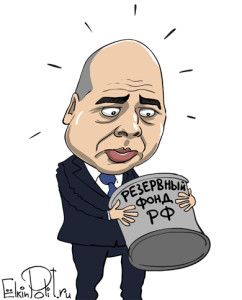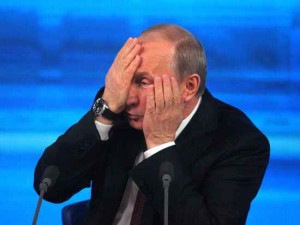 January 2016 turned out to be an unusually turbulent month for the Russian economy. After going into a deep tailspin, oil prices, stock indexes and the ruble recovered a little but there is no question of them reaching even the late-2015 level any time soon. By the end of the month, even annoyed Kremlin officials admitted that they were not expecting any miracles and the 2016 budget based on an oil price of $50 per barrel would have to be “cut”.
January 2016 turned out to be an unusually turbulent month for the Russian economy. After going into a deep tailspin, oil prices, stock indexes and the ruble recovered a little but there is no question of them reaching even the late-2015 level any time soon. By the end of the month, even annoyed Kremlin officials admitted that they were not expecting any miracles and the 2016 budget based on an oil price of $50 per barrel would have to be “cut”.
At a time when there is simply no money to cover the difference between the projected and the real oil price, the proposition-or rather, an ultimatum to reduce budget expenditures puts Putin on edge. “Do it if you want”, was the Russian president’s disgruntled reaction to budget cuts proposed during a closed meeting. The irritation of the career KGB officer is understandable. Oil prices do not respond to commands, and no matter how hard one might wish, missile launches and bombings of Syria will be of no help in this instance. On the other hand, the government is not prepared to use printing presses to replenish the budget deficit, since this would be a direct path to galloping inflation and other Russian realities of the 1990s while Putin believes it to be his main achievement of the last 15 years to have overcome those.
There is more than one reason for the imperial displeasure, such as the gradual realization that oil prices could drop to as low as $20 dollars a barrel, and although the current budget can still be stretched using reserve funds accumulated over the previous years, if oil prices remain that low, for Russia’s 2017 federal budget to balance, it would require a US dollar to be worth 210 rubles.
It is well known that oil and gas revenues account for more than 40 percent of Russia’s federal budget. Where does the second half come from? In 2016, the value-added tax (VAT), based on merchandise and services turnover, is supposed to account for more than a quarter of the federal budget. The saddening fact is that the population’s purchasing power is decreasing. Natalia Zubarevich, professor at the Moscow State University, notes that Russians, especially those living in regions, have switched to a crisis-inspired consumption pattern which means that people only buy the bare essentials and replace expensive and mid-range food products in their consumer baskets with cheaper analogues. Thus, budget revenues from the VAT should be expected to decrease soon.
Further signs of deepening negative trends are a decline in the country’s industrial production and a decrease in business activity index, both of which the Russian government usually avoids mentioning. However, in the United States for instance, these indicators are considered the most important ones when evaluating the health of the economy.
The reduction of wages and the switch from full-time employment to part-time employment will inevitably result in decreased revenues from the personal income tax, which is the main “regional” tax, the one that goes to regional and local budgets. This money is supposed to be spent on schools, hospitals, roads, housing and communal services, building renovations, provision of amenities and culture. The result of this process can already be seen. Such negative effects as growing tariffs for housing and communal services, canceled public transport services, slashed benefits for socially vulnerable groups are yet again becoming the most-discussed topics by both regional and federal media outlets. This is already happening but not everyone realizes that this is the beginning of a painful process of parting with illusions of the country’s prosperity under Putin.

Under these circumstances, calculating a budget for the next year is not just a difficult task-it is one “punishable by death”, because it will certainly trigger the population’s frustration and result in the resignation of the cabinet of ministers responsible for drafting it. Maybe this is the reason why there has recently been talks about Former Russian Finance Minister Kudrin’s return to government since he is one of the few Russian officials who are willing to make necessary but unpopular decisions. Meanwhile, no matter whether Kudrin returns to government or not, the population is getting prepared to survive since the poverty rate has been rising at a frightening speed. It is however unclear for how long people will be willing to take the present situation for granted especially considering that no matter how hard the regime tries, it cannot limit public access to information about the well-being of officials, their family members and friends.





